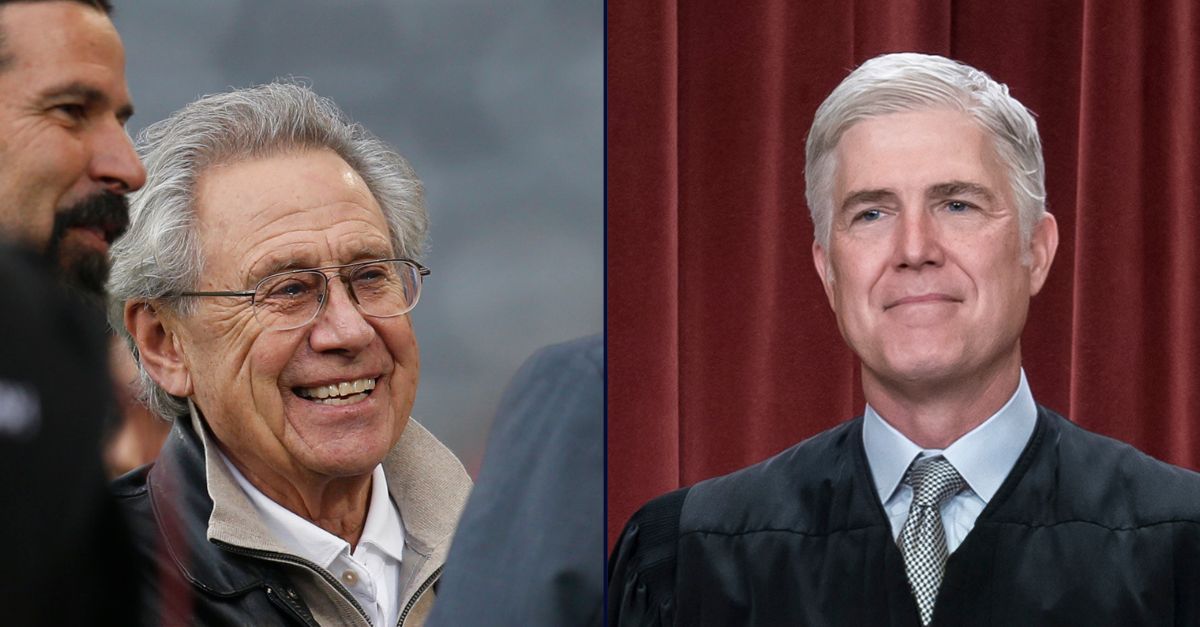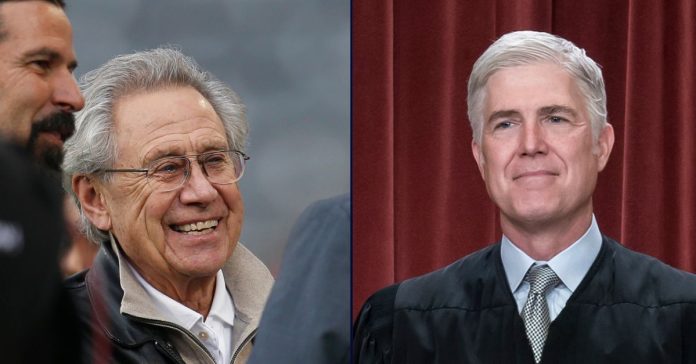
Left: Los Angeles Galaxy owner Philip Anschutz before the Galaxy face the Rapids in the first half of a MLS soccer game Saturday, March 12, 2016, in Commerce City, Colo. (AP Photo/David Zalubowski); Right: Supreme Court Justice Neil Gorsuch (Erin Schaff-Pool/Getty Images).
The justices of the U.S. Supreme Court are slated to hear oral arguments in a major case Wednesday morning, and Justice Neil Gorsuch has thus far ignored calls to recuse himself — despite his longstanding close relationship with a conservative billionaire who stands reap significant financial benefits, depending on the outcome of the case.
A burden on herring fisheries raises a nationwide controversy
Loper Bright Enterprizes, Inc. v. Raimondo involves a herring fishing company and a federal regulation of the National Marine Fisheries Service. Under the law, herring fishing boats must allow and pay for a person on board to serve as a compliance monitor. The requirement puts a financial strain on the already-struggling fishing industry.
The fishing company challenged the rule and argued that the federal Magnuson-Stevens Act does not require that the companies bear the burden of paying the compliance monitors. The D.C. Circuit sided 2-1 with the National Marine Fisheries Service, and ruled that it had properly interpreted its own regulation.
U.S. Circuit Judge Justin Walker, a Donald Trump appointee and protégé of Justice Brett Kavanaugh, dissented from the ruling, and said that if Congress had wanted the fishing industry to bear the increased financial burden, it would have said so, and that the Fisheries Service read its regulation incorrectly. The case landed before the Supreme Court after the fishing company appealed.
The eradication of Chevron deference: A conservative agenda item
In reaching its decision that the fisheries are subject to the compliance rule, the two-member majority applied the concept known as “Chevron deference”— the idea that any confusion over the precise meaning of a federal regulation should be clarified by the agencies specifically involved absent any direct conflict with a Congressional statute.
Conservatives generally — and Neil Gorsuch specifically — have essentially declared war on Chevron deference as a means to curtailing the authority of federal administrative agencies. They reason that federal executive branch agencies should not be permitted to interpret regulatory language, because that task must be reserved for the judiciary.
Gorsuch has, many times, been clear that he is opposed to Chevron deference, and once wrote in an opinion, “We managed to live with the administrative state before Chevron. We could do it again.”
“Chevron deference” was put into place by the Supreme Court in 1984 as a means of allowing agencies to apply highly-technical expertise to ambiguities of language. The Supreme Court granted certiorari in Loper Bright Enterprises solely to decide whether to eliminate Chevron deference for good.
Demands for recusal go unanswered
Just days before the high court will have the chance to eradicate Chevron deference, a government watchdog group called upon the doctrine’s chief judicial foe to recuse himself from the matter because of his links to a private industry billionaire who could benefit from a loosening of federal regulations.
The Guardian reported Tuesday that Caroline Ciccone, president of Accountable.US, urged Gorsuch to recuse himself from the case due to his longstanding close relationship with 84-year-old Philip Anschutz, a conservative Colorado billionaire oil baron. Anschutz, who also made his money in railroad and telecom and now owns the Coachella music festival, the NHL’s Los Angeles Kings, the Crypto.com arena, and the conservative publication The Washington Examiner, could potentially reap a windfall if Chevron deference is overruled.
The Supreme Court justice is arguably in his current rule because of Anschutz. Gorsuch worked at the law firm that represented the billionaire for over a decade from 1995-2005. The following year, Anschutz successfully lobbied the George W. Bush administration to nominate Gorsuch as a federal circuit judge for the U.S. Court of Appeals for the 10th Circuit.
“I am writing at the request of Philip F. Anschutz,” an attorney wrote in a letter to then-president Bush. The lawyer went on to suggest that Gorsuch be considered for a judicial appointment, and he advised that Anschutz had already conferred with Colorado’s Republican senator about the idea.
Gorsuch got the job. While he was serving on the 10th Circuit, he and Anschutz remained connected: Gorsuch would give speeches at the billionaire’s annual dove-hunting retreats at his Eagle’s Nest Ranch property (no, not that one).
Shortly before Gorsuch was appointed to the Supreme Court in 2017, the New York Times reported that he “has been partners in a limited-liability company with two of Mr. Anschutz’s top lieutenants,” and that together, the group built a vacation home on 40 acres along the Colorado River.
Indeed, ties between Gorsuch and Anschutz as they specifically relate to the future of Chevron deference were raised as far back as Gorsuch’s confirmation hearing. Many have argued that cutting back on federal regulatory authority would be the justice’s way furthering a hard-line conservative agenda that would benefit wealthy business owners including — but certainly not limited to — Anschutz.
Ciccone characterized Gorsuch’s relationship with Anschutz as “just the latest in a long pattern of cozy relationships between supreme court justices and billionaires creating conflicts that undermine the legitimacy of the court.”
Justice Ketanji Brown Jackson already recused herself from the case, because she heard oral arguments when she served as a judge on the D.C. Circuit. Jackson did not participate in the circuit court ruling, because she was replaced by Judge Sri Srinivasan after President Joe Biden nominated Jackson to the Supreme Court.
The Supreme Court justices all signed on to an official code of ethics last November, though the code has been harshly criticized for not including any mechanism for enforcement. Conservative Justice Clarence Thomas has been embroiled in multiple scandals relating to his relationships with billionaires and conservative activists.
Have a tip we should know? [email protected]

